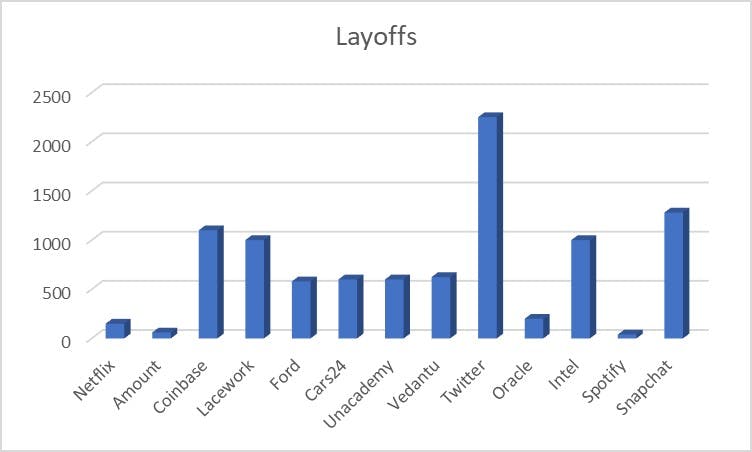How to get prepared for layoffs?
Getting laid off is stressful for your career; getting ready for it in advance is the best thing you can do, learn how to get prepared for the layoff.
Layoffs come with difficult times. This year layoffs are triggered mainly by the pandemic. Globally, the tech sector has taken a severe hit. Understand that getting fired and layoffs are two different things.
What does it mean to get laid off?
A layoff is a temporary or permanent termination of employment by an organization that is independent of the employee's performance.
Layoffs happen simply because investors want to see a free cash flow. Why free cash flow? To pay debts and dividends and grow in a declining environment as well.
This wave is enormous. Big names in the tech sector made headlines on the news for the wrong reasons. Netflix laid off around 450 employees, according to a WSJ story. Similarly, Cars24 laid off 600 employees, according to an ET report.
So, how can you get prepare for the unknown?
Effective ways to prepare for layoffs
You might think you have a secured job, your company is not in crisis, and your contributions can’t be replaced, but remember, layoffs are never about you. Layoffs are about a downward economy, pressure from investors, and a need to survive in the market.
Getting laid off is stressful for your career; getting ready for it in advance is the best thing you can do.
Let’s see how to get yourself prepared for the layoff.
Stay in the game
Even when your current job feels secure, never stop looking for opportunities. Researching for different opportunities passively does not harm. This is how you let recruiters know that you are open to opportunities. This is how you can land your dream job.
It also shows your current employer that you are not dependent on them. It’s a skill most hiring managers are looking for. Knowing that you have a steady stream of job leads is a win in all cases.
Don’t panic
Layoffs are when you need to be your best self to create more value, show your team management skills, and show courage.
Think rationally and get yourself ready for difficult decisions.
Understand the reality
It is necessary to see reality with no filter. If you get laid off, remember it’s not your fault. Layoffs are financial decisions formed by companies to survive in a downward economy, and they can happen at any time.
As soon as you know about layoffs in your organization, start preparing for the worst case possible. Get yourself emotionally ready. Keep track of your achievements and accomplishments.
Manage your career
The best possible thing you can do for yourself is to be updated with the latest technology. Having something going on the side can boost your career and resume. Keep track of your projects where you performed well.
Be ready to showcase your skills and yourself. “Show, Do tell” is the new marketing mantra. Let your network know what you are working on, how your contributions help the company to grow, etc.
Let your boss know how difficult their job will be without you. At the end of the day, selling is what everyone needs to do.
Keep your network fresh.
Be active in your community. Get in touch with people you have always admired. Networking is your lifeline. Plenty of times, during a layoff season, people only get opportunities through their network.
80% of people credit their current job to networking - Jobvite 2017 Job Seeker Nation Study study.
Back up everything
Your network, contacts, and documents that can be your proof of work are usually stored on a work computer, leaving you helpless if you don’t back them up from time to time. Make this a routine - back up important documents.
When you are advised to back up contacts, network, and documents that are in no way can be trouble for your existing company. Make sure to not back up (or use) anything that is confidential and should not go outside of your work computer.
Financial plan
Prepare your emergency fund. Layoffs can be temporary or permanent. It usually depends on the company and is mentioned in the email/letter provided by the company. Regardless, have a strategic plan to balance your financials.
It is advised to have an emergency fund to survive six months for any mishappening. Make sure to plan to pay for your health insurance for the duration you are in between jobs.
Ask for help
Find experts to help you find the right opportunities and path. Ask people who have gone through this to understand how you can handle layoffs better.
Talk to your manager about it, clear all your doubts, and be straightforward. This is no time to go around in circles. Show them how capable you are and be ready for whatever comes your way.
Be a reference to others
It is important. Sometimes, you find opportunities that don’t align with your job profile but can be helpful for someone in your network. Make sure to help people in your community (network) whenever possible.
It will only make your network strong, and you will become a reliable member of your community.
Negotiate
You might not believe this, but most companies want employees to negotiate their stay in the company. Not everyone does it, and those who do show their calm and intelligence while in a crisis.
Have a conversation with your manager and understand where they are coming from. Negotiate and see if there is any way you can stay with your current employer.


